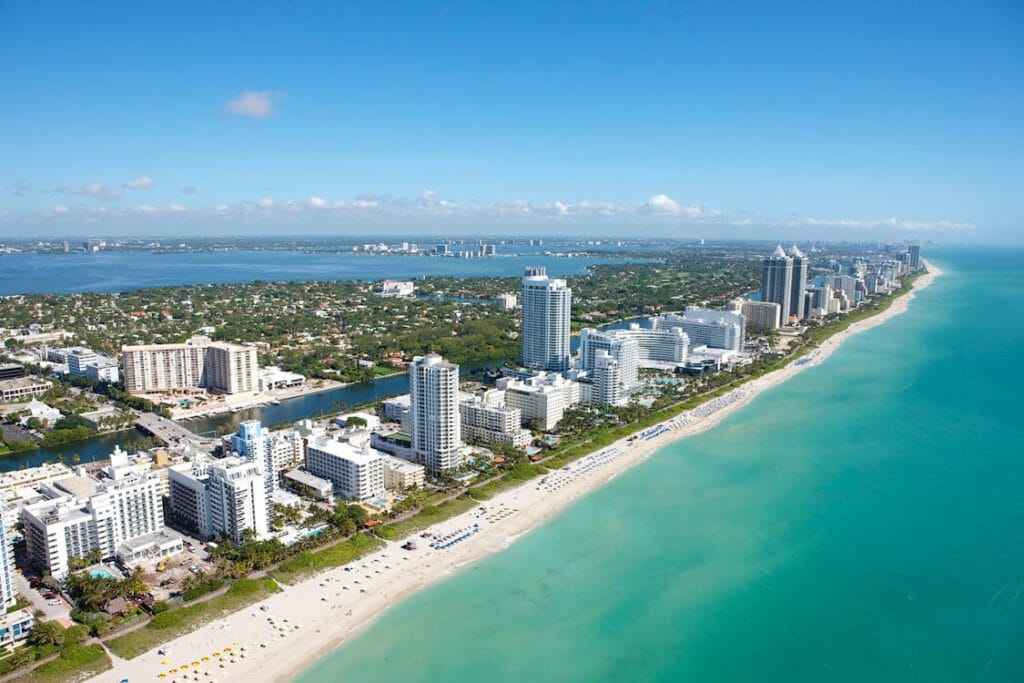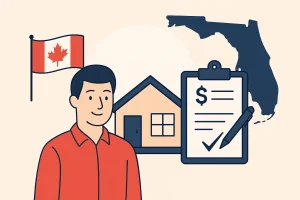Updated: August 15, 2025 • Reading time: ~12–15 minutes
Ready to buy? Start here:
- Miami for Canadian Investors (hub)
- Real Estate Services (buyer representation)
- Accounting Services (cross‑border filings & ITIN)
- Property Management (remote owners)
- Search Listings (Miami condos & homes)
- Book a cross‑border mortgage prep call
Securing a U.S. mortgage for Canadians in Florida is easier than it looks—especially in Miami, where lenders, agents, and service providers work with Canadian buyers every day. In this 2025 guide, you’ll learn exactly how to prepare your financing, how Florida condo rules affect approvals, which documents you need, and how to close on time with minimal stress. We’ll keep the language plain and action‑oriented so your U.S. mortgage for Canadians in Florida plan turns into keys in hand.
Quick Answer: Your 60‑Second Checklist
- Pick a cross‑border lender that underwrites Canadian income and credit (examples: RBC Bank, TD, CIBC, BMO).
- Get pre‑approved from Canada (many pre‑approvals are valid ~90–120 days; confirm your lender’s policy).
- Prepare documents: passport, employment/income proofs (T1/NOA), bank statements, and a clear usage plan (second home vs. investment).
- Short‑list financeable buildings: for condos, lender project review matters—budget, reserves, insurance, and maintenance status.
- Budget holistically: closing costs, taxes, insurance, HOA/condo fees, and currency conversion.
- Line up your team: Miami buyer’s agent, cross‑border lender, accountant for ITIN and filings, and (if renting) a property manager.
Follow these steps and you’re 80% of the way to a successful U.S. mortgage for Canadians in Florida outcome.
Why Miami and Why Now (Canadian context)

Miami blends lifestyle and investment: world‑class dining, beaches, arts, and a deep condo inventory across neighborhoods like Brickell, Edgewater, Downtown, Sunny Isles, and Aventura. Direct flights from Toronto, Montreal, and Vancouver make short stays realistic, while professional support—real estate, accounting, and property management—lets Canadians own remotely with confidence.
In 2025, lenders continue to welcome qualified foreign nationals, and cross‑border programs designed for Canadians have matured. That combination is excellent news for any buyer planning a U.S. mortgage for Canadians in Florida, particularly in Miami where building‑level data and condo documentation are more readily available for underwriting.
What Counts as a “U.S. Mortgage for Canadians in Florida”?
A U.S. mortgage for Canadians in Florida is a loan secured by Florida real estate and underwritten in the United States, often through a lender with cross‑border expertise. The most common occupancy types are:
- Second Home: Primarily for your use with limited rental; can offer better terms than pure investment loans.
- Investment Property: Intended for rental income; typically higher down payment and rate.
- Primary Residence: Rare unless you are relocating or meeting specific residency criteria.
Cross‑border programs evaluate your Canadian income, credit, and assets and map them to U.S. underwriting. That’s why selecting the right lender is foundational to any U.S. mortgage for Canadians in Florida plan.
How to Qualify (Credit, Income, Down Payment, Docs)
Credit & Income (using your Canadian history)
Specialized lenders can review your Canadian credit and verify Canadian income. Your file should show stable employment or business income, clean payment history, and a reasonable debt‑to‑income ratio once the new U.S. housing costs are included.
Down Payment (set expectations early)
Down payment minimums depend on the lender, property type, and occupancy. Second homes often enjoy lower minimums than pure investments. Rather than chase a single universal number, confirm the current requirement during pre‑approval and let that guide your property shortlist.
Documents Checklist (Canadian → U.S.)
- Passport (and visa if applicable)
- Proof of Canadian income (T1/NOA, T4s, accountant letter for self‑employed)
- Recent pay stubs or corporate financials
- 2–3 months of bank/investment statements (source of funds)
- Purchase contract (when in hand) and condo documents, if buying a condo
- Purpose/intent letter: second home vs. investment
Lenders Canadians Commonly Compare
Begin with banks experienced in cross‑border files:
- RBC Bank (U.S.) — cross‑border mortgages designed for Canadians
- TD — cross‑border banking with access to U.S. mortgage teams
- CIBC — U.S. mortgage solutions for Canadians
- BMO — cross‑border and U.S. mortgage programs
Compare process, timing, pre‑approval validity, and all‑in APR—not just the headline rate. Certainty of close is critical for a smooth U.S. mortgage for Canadians in Florida purchase.
The Step‑by‑Step Process (Pre‑Approval to Keys)
Step 1 — Get Pre‑Approved (from Canada)
Submit your application and documentation to obtain a pre‑approval letter (commonly valid around 90–120 days—verify with your lender). This lets you shop with confidence and signal seriousness to sellers.
Step 2 — Shortlist Properties with Financing in Mind
For condos, your approval depends on you and the building. Work with your agent to identify buildings known for healthy budgets, adequate reserves, proper insurance, and clean engineering/inspection histories.
Step 3 — Full Application, Disclosures & Rate Strategy
Once under contract, you’ll receive U.S. mortgage disclosures, finalize supporting documents, and decide when to lock your rate. Align the lock period with appraisal and condo project review timelines for U.S. mortgage for Canadians in Florida.
Step 4 — Condo Project Review (if buying a condo)
Lenders evaluate the building against standards similar to Fannie Mae project criteria—insurance coverage, reserve funding, owner‑occupancy, delinquency levels, and absence of significant deferred maintenance. Buildings that fail are often labeled “non‑warrantable,” limiting conforming loan options.
Step 5 — Appraisal & Underwriting
Your property must appraise near the contract price. Underwriting clears remaining conditions related to income, assets, title, insurance, and the condo association (if applicable).
Step 6 — Closing & Funding
Finalize documents (in person or via approved remote methods), wire funds for your down payment and closing costs, and receive the keys once the deed and mortgage are recorded.
Each step supports your central objective: a clean, on‑time U.S. mortgage for Canadians in Florida close.
Florida Condo Rules That Affect Your Mortgage
After the Surfside tragedy, Florida introduced significant reforms (including 2022–2023 legislation such as SB 4‑D and SB 154) to improve building safety and transparency. In practice, associations face stricter milestone inspections, more robust reserve studies, and clearer disclosure requirements. Many buildings have adjusted budgets and insurance coverage as a result.
What this means for Canadian buyers:
- Association fees may rise when reserves and insurance are updated.
- Lenders scrutinize condo health: insufficient reserves, pending critical repairs, or inadequate insurance can jeopardize financing.
- Screen buildings early with your agent and lender to avoid last‑minute surprises.
Understanding these rules upfront helps keep your U.S. mortgage for canadians in florida on track.
Rates, Terms & Program Types You’ll See
- Fixed vs. ARM: Weigh payment stability against initial pricing.
- Conforming vs. Jumbo: Loan size influences pricing, documentation, and investor appetite.
- Second‑home vs. Investment: Occupancy affects rate, down payment, and underwriting.
- Points & Locks: Choose a lock period that comfortably covers appraisal and condo review; buy points only if the breakeven suits your hold period.
For a successful U.S. mortgage for Canadians in Florida, prioritize certainty of close and building financeability over the absolute lowest headline rate.
Closing Costs, Escrows & Ongoing Expenses
Plan a realistic budget that includes both one‑time and recurring items:
One‑Time (Closing) Costs
- Appraisal, credit report, and underwriting/processing fees
- Title search, title insurance, settlement/escrow charges
- Recording fees and state/county taxes (e.g., documentary stamp taxes on deeds and mortgages)
- Attorney fees (if you engage counsel)
- Prepaids for taxes and insurance (to fund your escrow)
Recurring (Ownership) Costs
- Property taxes (often escrowed with the lender)
- Condo/HOA fees (may adjust as reserves and insurance evolve)
- Property and wind insurance
- Property management (if renting or if you prefer turnkey oversight)
- Maintenance and reserve for special assessments
A holistic view protects your U.S. mortgage for canadians in florida from surprise cash‑flow shocks.
Currency, Banking & Cross‑Border Cash Flow

Choose a bank with cross‑border capabilities so payments, rental deposits, and currency conversion are seamless. Many Canadians find it helpful to centralize USD inflows and outflows with a single institution experienced in cross‑border needs (e.g., RBC Bank, TD, CIBC, BMO). A simple, repeatable CAD↔USD workflow makes tracking and tax reporting easier to finalize for U.S. mortgage for Canadians in Florida.
Best practices:
- Align rent collection dates with mortgage payment dates.
- Use transparent FX solutions; avoid ad‑hoc conversions at poor rates.
- Keep a small USD reserve for insurance, HOA, and minor repairs.
This operational backbone is what turns a theoretical U.S. mortgage for canadians in florida into a smooth, sustainable ownership experience.
Tax & Compliance Primer (ITIN, 183‑Day Rule)
ITIN: If you earn U.S. rental income or need to file a U.S. return, you’ll typically require an Individual Taxpayer Identification Number. Learn more at the IRS: ITIN overview.
Substantial Presence Test (SPT): Spending too many days in the U.S. can trigger U.S. tax residency. See the IRS guide: Substantial Presence Test.
Coordinate early with your accountant so your mortgage timeline, ownership structure, and tax elections support your goals.
3 Real‑World Canadian Buyer Journeys
Toronto Family — Second Home (Brickell/Edgewater)
- Goal: Winter usage with occasional short‑term rentals
- Path: Cross‑border pre‑approval → shortlist financeable buildings → clean condo review → 45‑day close
- Tip: Keep usage aligned with second‑home guidelines to preserve favorable terms
Vancouver Investor — 12‑Month Tenant (Aventura/Sunny Isles)
- Goal: Stable NOI with minimal turnover
- Path: Compare lenders’ investment guidelines → pick buildings with strong budgets and reserves → lock rate after association docs are reviewed
- Tip: Focus on buildings with professional management and low delinquency
Montreal Snowbird — Boutique Condo (Miami Beach)
- Goal: Personal use + offset costs with seasonal rentals where permitted
- Path: Pre‑approval → inspect insurance, reserve studies, and upcoming assessments → close pre‑winter
- Tip: Verify municipal and building rules before planning short‑term rentals
FAQs
Do I need U.S. credit history to qualify?
Not necessarily. Cross‑border lenders can evaluate your Canadian credit and income.
How long is a pre‑approval valid?
Many lenders issue pre‑approvals that are valid around 90–120 days. Confirm specifics with your bank.
What if the condo is “non‑warrantable”?
Conforming financing may be unavailable for U.S. mortgage for Canadians in Florida. Vet the building early for reserves, insurance, litigation, and maintenance status.
What changed with Florida condos?
Recent legislation increased inspection and reserve requirements, which can affect fees and financing eligibility. Stronger buildings remain financeable; weaker ones may require specialty financing or cash.
Do I need an ITIN to get a mortgage?
Lender requirements vary for U.S. mortgage for Canadians in Florida. However, if you’ll report U.S. rental income, you typically need an ITIN to file a U.S. tax return.
How long does closing take?
Common timelines are 30–45 days for U.S. mortgage for Canadians in Florida, longer if condo review reveals issues that must be resolved.
How often should I use the exact phrase “U.S. mortgage for Canadians in Florida”?
Use it naturally in the title, introduction, a few headings, image ALT text, and conclusion. Prioritize readability over repetition.
Three Sample Paths to the Finish Line
Second‑Home Focus (Toronto couple): Pre‑approval with RBC → shortlist Brickell/Edgewater projects with strong reserves → conforming approval → 45‑day close.
Investor Focus (Vancouver professional): Compare RBC and CIBC U.S. → choose financeable buildings near demand drivers → factor higher down payment for investment use → lock and close.
Snowbird Focus (Montreal family): TD cross‑border banking/mortgage → pre‑screen insurance and inspection reports → confirm HOA rules for personal use → close pre‑winter.
The Bottom Line for Canadian Buyers
Securing a U.S. mortgage for Canadians in Florida isn’t just a financial step, it’s a project that benefits from the right team. Success comes when you combine:
- a cross-border lender who understands Canadian income and credit,
- a Miami buyer’s agent to screen properties and negotiate smartly,
- accounting support for ITINs, taxes, and cross-border filings, and
- (if renting) a trusted property manager to protect your investment.
The key is to screen buildings first, then commit with confidence. With the right preparation, Miami’s closing table feels less like a leap and more like a carefully checked box on your investment journey.
Ready to take the next step? Contact our team today and let’s build your cross-border mortgage plan together.



